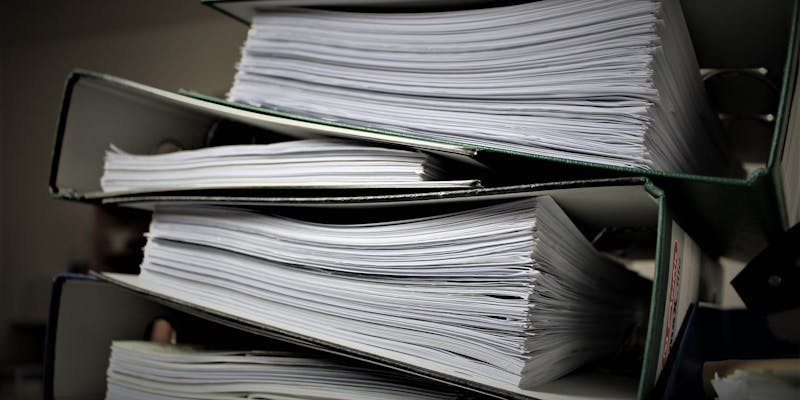Do you want to free up space in your filing cabinet without worrying about tax audits or identity theft? Keeping track of your tax records is essential, but knowing when it's safe to dispose of certain documents can be challenging.

In this blog post, we'll explore how long you should keep different types of tax records before considering disposal. By the end, you'll understand how to keep your tax records organized and clutter-free.
What Is the Ideal Duration for Keeping Tax Return Paperwork?
Here are some important guidelines for maintaining records in different tax situations.
Action for Deduction of Bad Debt or Worthless Securities
Documents supporting claims for losses arising from worthless securities or bad debt deductions must be retained for a minimum of seven years. Documentation about the securities or debts in question, together with any pertinent financial transactions or agreements, should all be included in these records.
Maintaining your records for this long will guarantee that you have the proof you need to back up your claim and show what you claimed as a loss or deduction on your tax return. You can comply with tax legislation and expedite the processing of your claim in the event that it is under examination or audit by tax authorities by keeping accurate documents for a period of seven years.
Claim for Refund or Credit Following Filing
It is necessary to keep records for a minimum of three years following the date of your initial tax return submission in order to make a claim for credit or refund. As an alternative, you can retain them for two years following the date on which you made the tax payment, whichever comes first.
This window of time guarantees that you have the records you need to back up your refund or credit claim, supplying proof of any purchases or deductions you make on your tax return.
Submitting a Deceptive Return
Keeping documents for as long as possible is essential if you file a fake tax return. It is a major offense to engage in fraudulent activities pertaining to tax returns, and keeping thorough records is necessary for compliance and legal reasons. Any supporting paperwork for the fraudulent activity, such as forged expenses, income statements, or other deceptive information filed to tax authorities, should be included in these records.

Maintaining documentation for as long as possible guarantees that you can answer truthfully in the event that you are questioned by tax authorities or that legal action is taken against you. It could also be required to keep these data on file in order to prove that you complied with tax laws and regulations and to defend your legal rights.
Failure to File a Tax Return
It is crucial to preserve records for as long as possible, even if you do not file a tax return. Even if you haven't filed a return, you should keep thorough records in case you later have to file or if the tax authorities ask for data pertaining to your income or financial activity.
Any pertinent financial records, such as bank statements, investment records, income statements, receipts, and other supporting paperwork, should be included in these records. You may guarantee adherence to tax rules and regulations and supply correct information if required in the future by maintaining records for an infinite period of time.
Income Not Reported
It's important to keep records for a minimum of six years if you underreport income, which makes up more than 25% of your gross income as recorded on your tax return. Any supporting documentation for the unreported income, such as bank statements, invoices, receipts, and other financial records that attest to the revenue received, should be included in these records.
By keeping records for this long, you can be sure you have the supporting paperwork you need to back any changes or corrections you make to your tax return, as well as the necessary proof to fix any reporting errors that may be found by tax authorities.
Tax Records of Employment
Records pertaining to employment taxes must be retained for a minimum of four years following the date of payment or the tax's due date, whichever comes first. Documentation about payroll taxes, such as employee earnings, taxes deducted, and employer contributions to Social Security, Medicare, and unemployment insurance, is included in these records.
Businesses can guarantee adherence to tax laws and regulations, streamline proper reporting and tax return filing, and furnish documentation in the event of audits or queries by tax authorities by keeping these data on file.
What is the Most Efficient Way to Get Rid of Your Private Tax Records?
Let's have a look at how to dispose of your confidential tax documents.
Shredding
One of the best and most secure ways to get rid of private tax paperwork is to shred them. If your home isn't equipped with a shredder, think about hiring a reputable document destruction service. These businesses guarantee that your private data is securely destroyed by providing cost-effective secure shredding services.

Expert Document Destruction Service
For rapid and simple disposal, several businesses provide secure document destruction at an affordable price. By ensuring that your private tax records are safely destroyed, these services guard against fraud and identity theft.
Shredding Events
During these free or inexpensive on-site document shredding sessions, people of certain towns can bring their records to be destroyed. Confidential document disposal is made easy and secure with these events.
Burning
Burning the documents in a fireplace or outdoor fire pit is an additional safe and regulated method. Shredding is more convenient and secure than burning, especially when dealing with greater amounts of documents.
The Bottom Line!
Keeping your tax records organized will ultimately save you a great deal of trouble. You'll be less stressed throughout tax season and ready for any audit if your tax documentation is filed correctly.
To avoid identity theft, keep in mind that even though you don't need to maintain tax records forever, you should dispose of them carefully. Maintaining organization and using safe document disposal techniques will help you handle your tax responsibilities more skillfully and stress-free.




